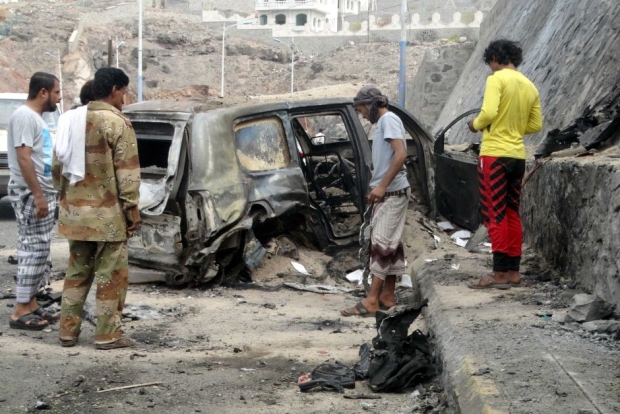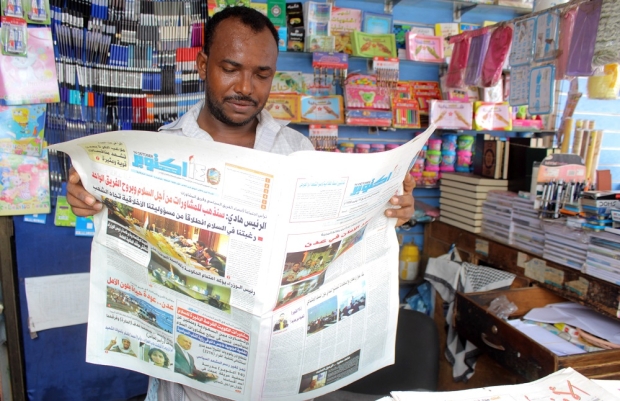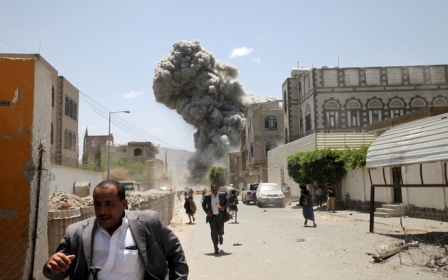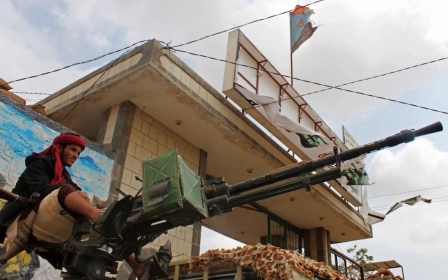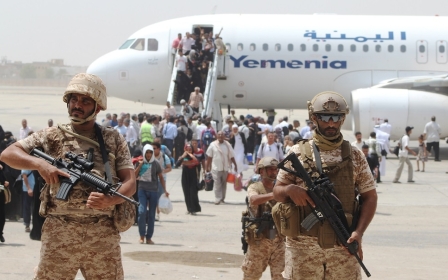Aden hitmen pick off Yemen president's supporters, one by one
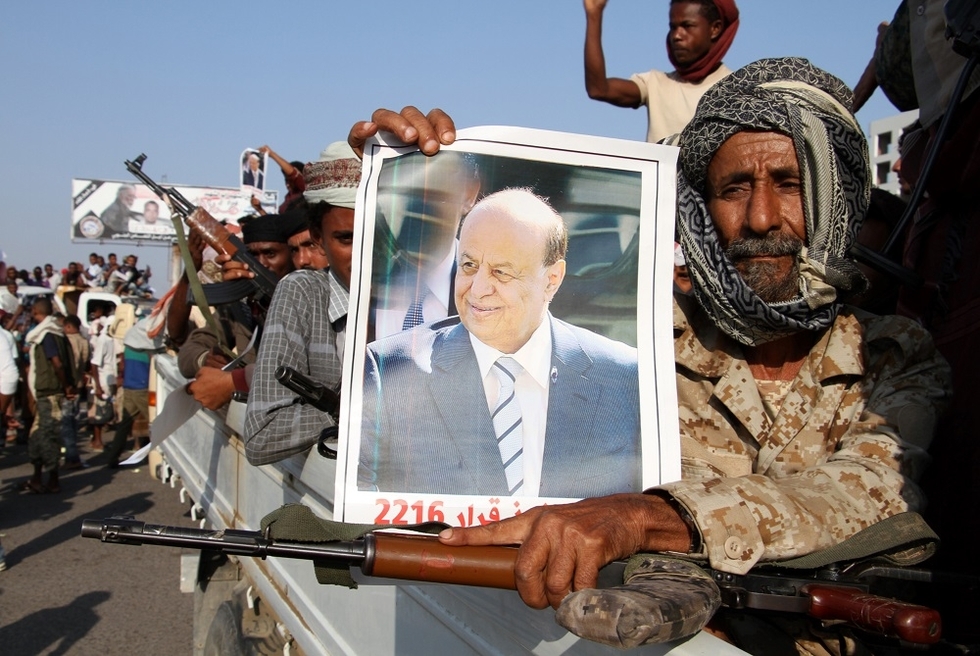
ADEN, Yemen - Military checkpoints are placed on all of Aden's entrances, UAE and Yemeni forces are spread across the city, and several military camps act as its centres of power.
Yet none of this has stopped the assassination of dozens of preachers and supporters of Abd Rabbuh Hadi, the Saudi-backed president - and their colleagues and the wider city want to know why.
The Tuesday assassination of Shawqi Kamadi, an Islah party leader and preacher at al-Thwar mosque, was the latest in dozens of "hits" on Hadi supporters, and many fear it will not be the last.
Preachers fear to speak about support for the president and other political issues, because there are many opponents in Aden
- pro-Hadi preacher
The killing comes after three pro-Hadi military leaders and a preacher were assassinated in the week previous, adding to the 22 pro-government preachers and dozens of pro-Hadi military leaders killed since the middle of 2016. No individual or group has claimed any of the killings.
Such is the situation in Aden. It is the seat of a president who has visited not once since fleeing to Riyadh in 2016 fearing for his life, and where his supporters are picked off one by one.
The city is de facto controlled by the UAE-backed "Security Belt", a militia hostile to Hadi's government and aligned to a secessionist movement lead by a former Aden governor he sacked.
Such a murky political backdrop, as alliances are weaved as quickly as others unravel, has led many to question who controls the hitmen behind the spate of targeted killings.
Cut down in the street
From his minbar (pulpit) almost every Friday, Kamadi would insist on support from the faithful for Hadi. His message was cut off when he was shot dead in the street by a gunman who fled the scene on a motorbike.
Hadi's minister of endowment, D Ahmed Atiya, called on the interior ministry and security forces to intervene to save others from the same fate. Investigations by both have so far produced nothing.
"We call the interior ministry and security forces to save other preachers and Islamic scientists.""Every day we hear about assassination of an imam, preacher or herald," she said on Facebook.
Another pro-Hadi preacher in Aden, who spoke anonymously, said: "Preachers fear to speak about support for the president and other political issues, because there are many opponents in Aden."
He said every preacher assassinated in Aden had been pro-Hadi.
"Some preachers insist to continue in their religious task, talking about sensitive political issues, but I am not going to talk about any political issue because there is no Emirati armoured vehicle protecting me and I am not outside Aden."
He stated that some pro-Hadi preachers faced anonymous threats to stop their public support for Hadi.
The accused
Suspicion, inevitably, has fallen on the "Security Belt" and, by extension, the UAE. The UAE opposes the Islah party, the Yemen branch of the Muslim Brotherhood, and forces from the Belt have burned and looted its Aden headquarters twice.
In January, Belt soldiers routed the presidential guard in a series of battles that stopped only at the gates of the presidential palace. And all the while, the assassins target Hadi and Islah supporters.
The undersecretary of the ministry of information, Abdulraqeeb al-Hudayani, accused the UAE of being behind the targeted killings. Suspects are rarely caught, but those who are end up in Emirati hands, and then disappear.
"Where are the three criminals who were involved in the assassination of Sheikh Abdurrahman al-Adani?" he said of a Salafi leader assassinated in February 2016. "Where are the killers of the former governor of Aden, Jaafar Mohammed Saad?"
Hudayani said suspects were arrested in both cases, sent to prisons controlled by the UAE, and never seen again.
"All of us know the killers and all evidence is in front of us but there is no strong government to stop the chaos in Aden," he said.
Tawakkol Karman, a Noble Peace Prize winner in 2011, said on Facebook: "The UAE supports the assassinations, to make the south its territory, but our population is stronger than them and those crimes will not pass without someone being held to account.
"We will call to account Mohammed bin Zayed and Mohammed bin Salman over all clear and hidden crimes against Yemenis," she said in reference to the leaders of Saudi Arabia and the UAE.
"I stand with the Islah party, Salafis and the all population who were betrayed by their bad neighbours."
A source in Aden's police station said some killers had been caught but it was difficult for security forces to protect the hundreds of preachers in Aden.
"Not only preachers but also military leaders were killed in Aden, it is difficult to protect everyone," the source told MEE, but added that Aden was not alone in suffering targeted killings.
Al-Qaeda's shadow
Baraa Moneer, a fighter in the "Security Belt" force, denied UAE involvement, saying such attacks had been common even before the Yemen war began in 2015.
"Some people accuse the UAE of any crime in Aden but the fact says the UAE does everything positive to Aden and it has reconstructed the public institutions in the city," Moneer said.
It is not true that the UAE is behind assassinations in the city... there may be some members of al-Qaeda trying to create chaos
- Baraa Moneer, "Security Belt" fighter
"This is not a new thing - it is not true that the UAE is behind assassinations in the city."
Moneer said al-Qaeda was trying to create chaos in Aden, after it was kicked out of the city by the Yemeni army, backed by the Saudi-led coalition, in 2016.
"The Yemeni army, backed by the UAE, liberated Aden from al-Qaeda and there may be some members of al-Qaeda trying to create chaos in the city."
But the latest assassinations do not fit their brief - al-Qaeda has carried out targeted killings in several provinces, but always claimed them.
Aden the victim
Mahdi Haroon, a resident of Aden, believes that the increase of assassinations in his city threatens the future of the city and makes Aden unsafe for everyone.
"When the investors hear about assassinations in Aden, they avoid investing in Aden and go to build their project in other provinces like Marib," Haroon said.
"The Yemeni army liberated the city from the Houthis and now we hope to liberate it from the cells which try to create chaos by assassinations."
Fadhl al-Rabie, a political analyst and the head of Madar Strategic Studies Centre in Aden, agreed.
"Assassinations affect the whole city as it becomes a city of crime and unsafe," Rabie said.
"Cities, not parties, fall by assassinations. The names of victims fade but the reputation of the city is forever tarnished. Regardless of the killer and the victim, the main victim is Aden."
Middle East Eye propose une couverture et une analyse indépendantes et incomparables du Moyen-Orient, de l’Afrique du Nord et d’autres régions du monde. Pour en savoir plus sur la reprise de ce contenu et les frais qui s’appliquent, veuillez remplir ce formulaire [en anglais]. Pour en savoir plus sur MEE, cliquez ici [en anglais].


